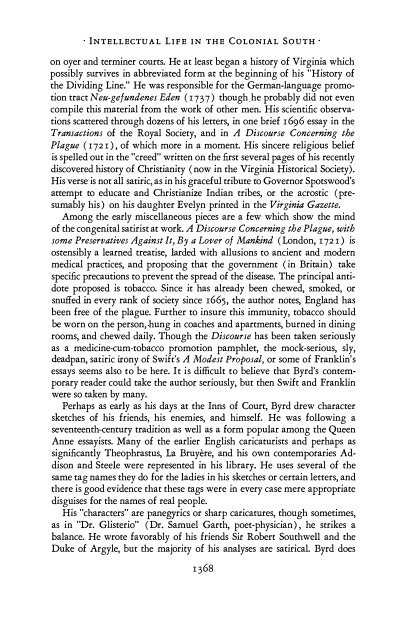Literature, Principally Belletristic - University of Tennessee, Knoxville
Literature, Principally Belletristic - University of Tennessee, Knoxville
Literature, Principally Belletristic - University of Tennessee, Knoxville
You also want an ePaper? Increase the reach of your titles
YUMPU automatically turns print PDFs into web optimized ePapers that Google loves.
· INTELLECTUAL LIFE IN THE COLONIAL SOUTH '<br />
on oyer and terminer courts. He at least began a history <strong>of</strong> Virginia which<br />
possibly survives in abbreviated form at the beginning <strong>of</strong> his "History <strong>of</strong><br />
the Dividing Line." He was responsible for the German-language promotion<br />
tract Neu-gefundenes Eden (1737) though he probably did not even<br />
compile this material from the work <strong>of</strong> other men. His scientific observations<br />
scattered through dozens <strong>of</strong> his letters, in one brief 1696 essay in the<br />
Transactions <strong>of</strong> the Royal Society, and in A Discourse Concerning the<br />
Plague (1721), <strong>of</strong> which more in a moment. His sincere religious belief<br />
is spelled out in the "creed" written on the first several pages <strong>of</strong> his recently<br />
discovered history <strong>of</strong> Christianity (now in the Virginia Historical Society).<br />
His verse is not all satiric, as in his graceful tribute to Governor Spotswood's<br />
attempt to educate and Christianize Indian tribes, or the acrostic (presumably<br />
his ) on his daughter Evelyn printed in the Virginia Gazette.<br />
Among the early miscellaneous pieces are a few which show the mind<br />
<strong>of</strong> the congenital satirist at work. A Discourse Concerning the Plague, with<br />
some Preservatives Against It, By a Lover <strong>of</strong> Mankind (London, 1721) is<br />
ostensibly a learned treatise, larded with allusions to ancient and modern<br />
medical practices, and proposing that the government (in Britain) take<br />
specific precautions to prevent the spread <strong>of</strong> the disease. The principal antidote<br />
proposed is tobacco. Since it has already been chewed, smoked, or<br />
snuffed in every rank <strong>of</strong> society since 1665, the author notes, England has<br />
been free <strong>of</strong> the plague. Further to insure this immunity, tobacco should<br />
be worn on the person,hung in coaches and apartments, burned in dining<br />
rooms, and chewed daily. Though the Discourse has been taken seriously<br />
as a medicine-cum-tobacco promotion pamphlet, the mock-serious, sly,<br />
deadpan, satiric irony <strong>of</strong> Swift's A Modest Proposal, or some <strong>of</strong> Franklin's<br />
essays seems also to be here. It is difficult to believe that Byrd's contemporary<br />
reader could take the author seriously, but then Swift and Franklin<br />
were so taken by many.<br />
Perhaps as early as his days at the Inns <strong>of</strong> Court, Byrd drew character<br />
sketches <strong>of</strong> his friends, his enemies, and himself. He was following a<br />
seventeenth-century tradition as well as a form popular among the Queen<br />
Anne essayists. Many <strong>of</strong> the earlier English caricaturists and perhaps as<br />
significantly Theophrastus, La Bruyere, and his own contemporaries Addison<br />
and Steele were represented in his library. He uses several <strong>of</strong> the<br />
same tag names they do for the ladies in his sketches or certain letters, and<br />
there is good evidence that these tags were in every case mere appropriate<br />
disguises for the names <strong>of</strong> real people.<br />
His "characters" are panegyrics or sharp caricatures, though sometimes,<br />
as in "Dr. Glisterio" (Dr. Samuel Garth, poet-physician), he strikes a<br />
balance. He wrote favorably <strong>of</strong> his friends Sir Robert Southwell and the<br />
Duke <strong>of</strong> Argyle, but the majority <strong>of</strong> his analyses are satirical. Byrd does<br />
1368















